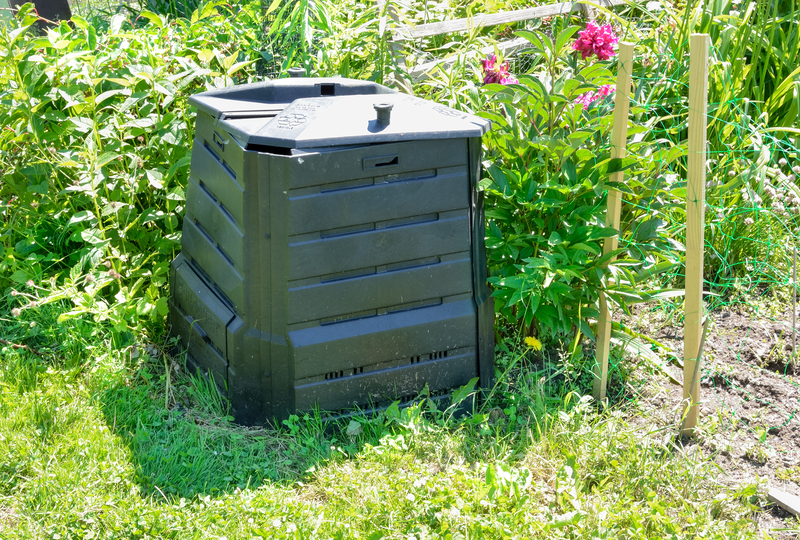Practical Advice for Optimizing Your Skip Hire
If you're planning a home renovation, garden clearance, or large-scale commercial project, hiring a skip is often the most efficient way to manage waste. However, optimizing your skip hire is crucial if you want to save money, minimize environmental impact, and streamline your project's workflow. This comprehensive guide covers practical steps, expert tips, and industry insights to help you get the most out of your skip hire service.

1. Understanding Skip Hire: The Basics
Before you dive into the practicalities, it's helpful to understand what skip hire involves:
- What is Skip Hire? - It's a service that allows you to rent large, open-topped waste containers (skips) for collecting, removing, and disposing of unwanted materials.
- Who Needs Skip Hire? - Homeowners, builders, landscapers, and businesses tackling projects that generate significant waste volumes.
- Benefits of Using Skip Hire Services: - Convenience, cost-effectiveness, safety, and environmental compliance.
Why Optimization Matters
Optimizing your skip hire isn't just about choosing the right size or provider. Proper planning and efficient usage can help you avoid extra charges, speed up your project, and reduce your environmental footprint.
2. Choose the Perfect Skip Size for Your Needs
Selecting the right skip size is essential. Too small, and you'll need multiple collections; too large, and you'll overpay. Here's a quick guide:
- Mini Skip (2-3 yards): Best for small household clearances and minor garden work.
- Midi Skip (4-5 yards): Suitable for kitchen/bathroom refits, attic clean-outs, or moderate renovations.
- Builder's Skip (6-8 yards): Ideal for building projects; accommodates heavy debris like rubble, soil, and concrete.
- Large Skip (10-12 yards): Excellent for bulky household waste or commercial jobs.
- Roll-on Roll-off (20-40 yards): Designed for major construction work or commercial premises clearing vast amounts of waste.
Tip: Always overestimate slightly if unsure, as overfilling a skip can result in penalties and the need for a second hire.
3. Plan Your Waste Types for Maximum Efficiency
Not all items can go into a skip. Knowing what you can and cannot dispose of will optimize your skip hire experience:
- Allowed: General household items, old furniture, soil, wood, non-contaminated garden waste, bricks, and tiles.
- Prohibited Items: Electronics, asbestos, chemicals, paint, batteries, tyres, fridges, hazardous waste, and medical waste.
Sort waste at the source: Set up clear piles for recyclables, green waste, and landfill items to help the skip provider recycle more efficiently. Some companies offer specialized skips for green waste, inert waste, or mixed materials--ask about these for cost and sustainability benefits.
Practical Sorting Tips
- Designate waste stations as you clear your space.
- Bag up light, loose waste (like paper and insulation) to prevent it from blowing away.
- Break down large items to save space (e.g., dismantle furniture, flatten boxes).
4. Strategically Place Your Skip
Where you place the skip is critical for safety and convenience:
- Accessibility: Choose a spot with easy access for both your team and the skip lorry.
- Permit Requirements: Skips placed on public roads may need council permits (fees and conditions vary). Avoid delays by securing permits well in advance.
- Ground Protection: Place plywood or boards under the skip to protect driveways and lawns from damage.
Tip: Place the skip close to the area of work, but make sure it doesn't block entrances, emergency exits, or create trip hazards.
5. Maximize Skip Space: Smart Loading Techniques
Skip hire optimization often comes down to how efficiently you load your skip. Avoid under-filling and wasted space using these techniques:
- Disassemble Bulky Items: Flat-pack furniture, break down doors, and cut up branches before loading to minimize gaps.
- Load Flat and Evenly: Start with heavier, flatter items on the base and fill gaps with smaller debris.
- Fill Gaps: Stuff soft items (like textiles and carpets) into crevices between hard waste.
- Break Up Mixed Loads: Alternate layers of different waste types for stability and optimal use of space.
Remember: For safety and legality, never fill your skip above its "Fill Level" mark. Overfilled skips cannot be transported and will incur extra charges.
6. Coordinate Skip Delivery and Collection Times
Timing is everything when it comes to efficient skip hire. Here's how you can stay ahead:
- Schedule Delivery: Have the skip delivered right before you start your project to maximize use time.
- Plan Collection: Arrange prompt collection once full to prevent unauthorized waste dumping by passers-by (a common problem known as "fly-tipping").
- Notify Neighbours: If you're on a residential street, let your neighbours know. This avoids disputes and ensures smooth maneuvering for the skip lorry.
7. Compare Skip Hire Companies: Get the Best Value
Not all skip companies are created equal. To truly optimize your skip hire experience, you need to shop around. Consider:
- Transparent Pricing: Look for companies offering clear, upfront pricing with no hidden charges for permits or waste types.
- Range of Skip Sizes: Ensure your provider offers a variety and can advise you on the most suitable for your job.
- Customer Reviews: Read testimonials and third-party reviews for reliability and service quality.
- Recycling Policies: Responsible skip hire companies recycle as much as possible, diverting waste from landfill.
Get quotes from at least three providers and check what's included--such as site protection, permit assistance, same-day delivery, or weekend collection services.
8. Sustainable Skip Hire: Minimize Environmental Impact
With sustainability becoming ever more important, optimizing skip hire for eco-friendliness is both responsible and often more cost-effective:
- Request Waste Audits: For larger projects, ask companies if they can provide a breakdown of how your waste is recycled.
- Choose Green Providers: Work with skip companies certified by recycling authorities or recognized for their green credentials.
- Segregate Waste: Separating reusables and recyclables (such as metals, wood, and plastics) can sometimes reduce your hire price or disposal fees.
- Reuse Where Possible: Donate usable household items and offer surplus building materials to local charities or reuse networks.
By following these steps, you're not just optimizing your skip hire logistics, but actively reducing your impact on the environment and possibly lowering costs.
9. Legal and Safety Considerations in Skip Hire
Whether you're hiring a skip for a home improvement project or a commercial job, there are important legal and safety points to consider:
- Permits: Always secure the correct council permits if placing skips on public property.
- Safe Loading: Don't put hazardous or prohibited items in the skip; fines and penalties may apply.
- Visibility: For roadside skips, use reflective markings, cones, and safety lamps at night to prevent accidents.
- Access: Ensure there is safe, clear access for skip drop-off and collection (overhead wires, parked cars, or uneven ground can cause issues).
10. How to Avoid Common Skip Hire Mistakes
Even seasoned DIYers and contractors can miss a trick when it comes to getting the most from skip hire. Avoid these pitfalls:
- Leaving too late: Last-minute bookings can mean poor availability or expensive rates.
- Ignoring weight limits: Skips have maximum weights; especially important for soil, rubble, and concrete. Exceeding can incur charges or refusal to collect.
- Not separating waste: Co-mingling waste can raise your costs and reduce recycling rates.
Pro Tip: Some skip companies offer specialized collections for items like plasterboard, electronics, or confidential papers. If you have unique disposal needs, mention them up front for tailored advice.
11. Cost-Saving Tactics: How to Make Your Skip Hire Cheaper
Everyone wants value for money, so here are ways to save on skip hire costs without sacrificing convenience:
- Book in Advance: It's often cheaper and you get the pick of delivery slots.
- Share a Skip: Split the cost with neighbours or colleagues if you're all doing clear-outs at the same time.
- Tightly Pack Your Skip: The tighter the packing, the fewer collections you'll need, and the smaller (cheaper) the skip.
- Use Alternative Collection Services: For single items (fridge, mattress), check if a council or private bulky-waste service is more cost-effective.
12. Frequently Asked Questions about Skip Hire Optimization
How long can I keep a skip for?
Most companies offer flexible hire periods, from a few days to several weeks. Always clarify the terms to avoid late return charges.
Can I put my skip on the road?
Usually, yes, but you'll need a permit from your local authority. Many skip hire firms handle this paperwork for you (often for a fee).
What happens to my waste after collection?
Reputable skip companies transport your waste to licensed recycling facilities, where the contents are sorted and processed. Where possible, recyclables are diverted from landfill.

13. Summary: Your Checklist for Optimum Skip Hire
- Assess Waste Volume and Types before booking.
- Choose the Correct Skip Size and never overfill.
- Plan Strategic Placement of the skip for convenience and permitting.
- Load Efficiently by breaking down items and filling gaps.
- Use a Responsible, Well-Reviewed Skip Provider with clear recycling policies.
- Schedule Collections to fit your project timeline (avoid overrun fees).
- Follow Legal Guidelines for safety and compliance.
14. Your Next Steps for Streamlined Skip Hire
If you follow the above practical advice for optimizing your skip hire, you can save time, money, and hassle while making your project greener and more efficient. Take the time to plan your skip usage, research local companies, and always prioritize environmentally sound practices and legal compliance.
Are you ready to optimize your next skip hire experience? Start by assessing your waste, comparing providers, and booking your skip in advance--you'll thank yourself later!
Efficient skip management isn't just practical--it's the foundation of a successful renovation, construction, or clearance project.